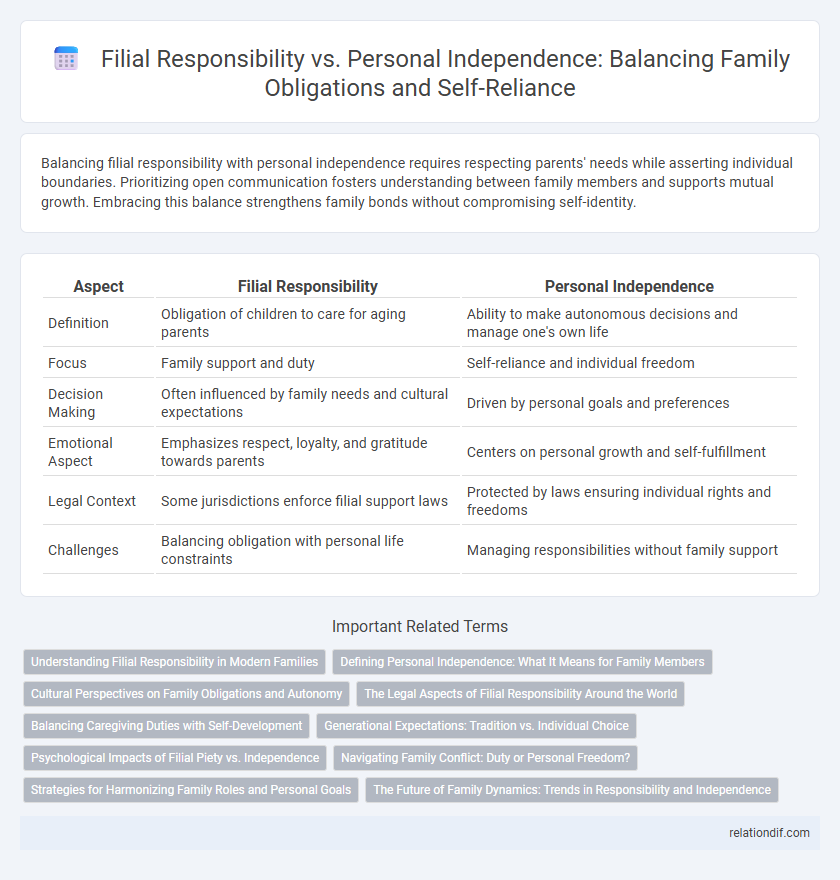Balancing filial responsibility with personal independence requires respecting parents' needs while asserting individual boundaries. Prioritizing open communication fosters understanding between family members and supports mutual growth. Embracing this balance strengthens family bonds without compromising self-identity.
Table of Comparison
| Aspect | Filial Responsibility | Personal Independence |
|---|---|---|
| Definition | Obligation of children to care for aging parents | Ability to make autonomous decisions and manage one's own life |
| Focus | Family support and duty | Self-reliance and individual freedom |
| Decision Making | Often influenced by family needs and cultural expectations | Driven by personal goals and preferences |
| Emotional Aspect | Emphasizes respect, loyalty, and gratitude towards parents | Centers on personal growth and self-fulfillment |
| Legal Context | Some jurisdictions enforce filial support laws | Protected by laws ensuring individual rights and freedoms |
| Challenges | Balancing obligation with personal life constraints | Managing responsibilities without family support |
Understanding Filial Responsibility in Modern Families
Filial responsibility in modern families emphasizes caring for aging parents while balancing personal independence, reflecting evolving social norms and economic realities. Legal frameworks in various countries increasingly recognize and mandate support for elderly family members, highlighting the ethical and cultural expectations of adult children. Effective communication and mutual respect between generations foster stronger family bonds and enable a harmonious approach to shared responsibilities.
Defining Personal Independence: What It Means for Family Members
Personal independence in a family context refers to the ability of each member to make autonomous decisions, manage their own affairs, and pursue individual goals while respecting the family unit. It involves self-reliance, financial stability, and emotional maturity, enabling members to contribute meaningfully without losing their sense of identity. Defining personal independence helps balance filial responsibility by clarifying boundaries between support and self-sufficiency among family members.
Cultural Perspectives on Family Obligations and Autonomy
Cultural perspectives on family obligations and autonomy vary widely, influencing the balance between filial responsibility and personal independence. In collectivist societies such as China and India, filial piety is deeply ingrained, emphasizing adult children's duty to care for elderly parents, often prioritizing family needs over individual aspirations. Conversely, Western cultures typically promote personal independence, valuing self-reliance and individual freedom, which can lead to more negotiated and flexible family roles.
The Legal Aspects of Filial Responsibility Around the World
Filial responsibility laws vary significantly worldwide, imposing legal duties on adult children to financially support aging parents in countries like China, India, and parts of the United States. Enforcement mechanisms include court orders, fines, or even imprisonment, reflecting the balance between societal obligation and individual rights. Personal independence may clash with these legal mandates, prompting complex debates on ethical obligations and state intervention in family care dynamics.
Balancing Caregiving Duties with Self-Development
Balancing filial responsibility with personal independence requires mindful allocation of time and energy towards caregiving duties while pursuing individual growth goals. Effective communication and boundary-setting within family dynamics enable caregivers to maintain emotional well-being and professional development. Prioritizing self-care alongside supporting aging parents fosters sustainable caregiving and personal fulfillment.
Generational Expectations: Tradition vs. Individual Choice
Filial responsibility often emphasizes honoring generational expectations rooted in cultural traditions that prioritize caregiving and respect for elders within the family unit. Personal independence challenges these norms by valuing individual choice and self-determination, creating a dynamic tension between collective family duties and personal aspirations. Balancing tradition with autonomy requires navigating deeply ingrained societal values while respecting evolving views on personal freedom and family roles.
Psychological Impacts of Filial Piety vs. Independence
Filial responsibility fosters strong family bonds but can also increase psychological stress due to obligation and reduced personal autonomy. Personal independence enhances self-esteem and mental well-being by promoting autonomy and self-expression. Balancing filial piety with independence is essential to maintain emotional health and family harmony.
Navigating Family Conflict: Duty or Personal Freedom?
Balancing filial responsibility with personal independence requires understanding cultural expectations and individual boundaries to navigate family conflict effectively. Prioritizing open communication and mutual respect helps reconcile duties toward aging parents with the pursuit of personal freedom. Establishing clear roles and shared decision-making fosters harmony while honoring both family obligations and individual autonomy.
Strategies for Harmonizing Family Roles and Personal Goals
Balancing filial responsibility with personal independence involves setting clear boundaries and open communication within family roles. Prioritizing mutual respect and understanding enables individuals to honor family obligations while pursuing personal goals effectively. Implementing flexible schedules and shared decision-making fosters harmony between collective duties and individual aspirations.
The Future of Family Dynamics: Trends in Responsibility and Independence
Emerging family dynamics reveal a shift where filial responsibility increasingly balances with personal independence, reflecting evolving cultural and societal values. Data from recent sociological studies indicate younger generations prioritize self-sufficiency while still upholding obligations toward aging parents, suggesting a hybrid model of support. This trend reshapes caregiving roles and financial planning within families, highlighting adaptability as a key factor in future family structures.
Filial responsibility vs Personal independence Infographic

 relationdif.com
relationdif.com